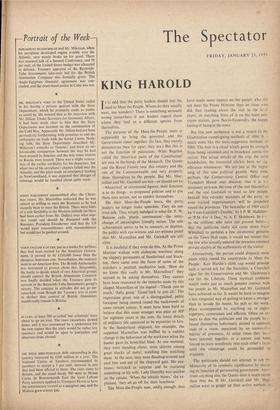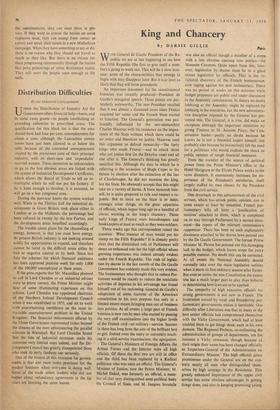KING HAROLD
T is odd that the party leaders should feel the I need to Meet the People. Whom do they usually meet, one wonders? There is something seriously wrong somewhere if our leaders regard those whom they lead as a different species from themselves.
The purpose of the Meet-the-People tours is supposedly to bring the governed and the. Government closer together. (In fact, they merely demonstrate how far apart they are.) But this is not the function of politicians. What Bagehot called the 'theatrical parts of the Constitution' are now in the hands of the Monarch. The Queen and the Royal Family tour this country and the, rest of the Commonwealth and very properly show themselves to the people. But Mr. Mac- millan and M r. Gaitskell are not—or should not be —(theatrical' or ceremonial figures; their function is to do things : to propound policies and to put them into action, not to exhibit themselves.
On their Meet-the-People tours, the party, leaders no longer make speeches. They do not even talk. They simply indulged in what Dr. F. W. Bateson calls 'phatic communion'—the inter- change of meaningless friendly noises. The sole achievement seems to be to reassure, or depress, the public with eye-witness and ear-witness proof that Mr. Macmillan and Mr. Gaitskell are still alive.
It is doubtful if they even do this. As the Prime Minister walked with elaborate wariness along the slippery pavements of Sunderland and Stock- ton, there came over the faces of some of the watchers a puzzled, meditative look. 'How do we know this really is Mr. Macmillan?' they seemed to be asking themselves. They cannot have been reassured by the remarks made by this alleged Macmillan of the legend—'Thank you so much,' Jolly good,' Good luck to you all.' The impression given was of a distinguished, polite foreigner being steered round the backwoods of some remote colony. It must have been hard to believe that this same stranger was once an MP' for eighteen years in the area. So 'many details of ordinary life appeared to be mysteries to him. In the Sunderland shipyard, for example, the supposed Macmillan was baffled by a sudden change in the behaviour of the workmen when the hooter gave its bronchial blast. At one moment, they were standing about, arms akimbo among great blocks of metal, watching him watching them. At the next, they were flooding around and past him and out of the shipyard gate. His eye- brows twitched in surprise and he muttered something .to his wife. Lady Dorothy was quicker On the Uptake. 'When the whiitle blows,' she ex- plained, 'they all go off for their luncheon.'
The Meet-the-People tour, oddly, enough, may
have made more impact on the people who did not meet the Prime Minister than on those w ho did. Just reading about the visit in the paper, or watching films of it on the local tele- vision station, gave North-Easterners the happy feeling of being in the news.
But this. new technique is not a return to the Gladstonian campaigning methods of 1884. It mueh• more like the mass-suggestion methods at 1984. The tour is a ritual which gains its strength from being recorded and re-broadcast across the nation. The actual details of the trip, the solid handshakes, the treasured' clichés have no sig- nificance whatsoever. We are just at the begin- ning of this new political gambit. Next time, perhaps, the Conservative Central Office and Transport House may discover that it is n necessary to waste the time of the real Macmillan and the real Gaitskell to meet so few people. Instead, less, valuable members of the party, or even trained impersonators, will be propelled round the provinces. The best-seller of 1969 could be 'I was Gaitskell's Double,' by J. P. W. Mallalie,1 or 'P.M. For A Day,' by A: E. Matthews. So Icr • as the millions whO were not present belieyc.i that the politician .really did come down from Whitehall to perform a few ceremonial gestures on the Town Hall steps, it would not matter that the few who actually entered the presence retained private doubts Of the authenticity of the visitor.
Alternatively, the parties could dispatch some pious relics round the countryside to Meet the People : Keir Hardie's cloth cap would provide such a sacred ark for the Socialists, a Churchill cigar for the Conservatives and Mr. Gladstone's axe for the Liberals. These mystical emblems would make just as much genuine contact with the people as Mr. Macmillan and Mr. Gaitskell have achieved so far. It would be hard to imagine a less congenial way of getting to know a stranger than to invade his house, his pub or his work- place accompanied by anything up to eighty reporters, cameramen and officials. Often on th.• tours to date the politician and the people found thetriselves ludicrously pinned in opposite ends of a room, separated by an immoveh barrier of pressmen. At other times they ha%'.: been jammed together in a corner and been forced to stare wordlessly into each other's face; until the entourage could be persuaded to evacuate.
The politicians shduld not attempt to rob the Monarchy of its symbolic significance by Usurp- ing its function of personating government. Aptir: from anything else, the Queen does it much better than they do. If Mr. Gaitskell and Mr. Mac- millan want to ginger up their active workers in the constituencies, they can meet them in pri- vate. If they want to arouse the nation on some explosive issue, they can stump from corner to corner and speak their minds in a new Midlothian campaign. When they have something to say or do, there is no reason why they should not travel as much as they like. But there is no excuse for them progressing ceremonially through the nation like petty princelings of some Ruritanian realm. They will meet the people soon enough at the











































 Previous page
Previous page